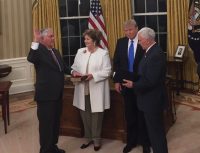China Seeking to Prevent America, North Korea, and South Korea from Colliding Head On
Sawako Uchida, Ri Kuk-Chol, and Lee Jay Walker
Modern Tokyo Times
The government of China is trying to quell militant voices in the respective governments of America, North Korea, and South Korea. This is based on the ongoing militarization and political polarization of the Korean Peninsula. At the same time, China and the Russian Federation are disillusioned by South Korea promising to deploy an anti-missile system that both nations deem to be Washington’s regional containment policy. Therefore, South Korea is in a weaker position than normal with China given the current prevailing conditions in this nation.
Indeed, South Korea is in political turmoil based on corruption, cronyism, and other important issues involving big business. Similarly, unlike North Korea that protects itself, the government of South Korea relies heavily on America for protection. This reality means past and current administrations in America can play revolving intrigues that infringe on the elites of South Korea. On top of this, sometimes this dual approach works but at other times the political situation in South Korea may lead to dual purposes. Likewise, at certain times militant voices in South Korea can also try to manipulate America during times of internal stress.
Hua Chunying, a spokesperson for the Foreign Ministry of China, clearly pointed the finger at all interested parties. She said, “The current situation of the Korean Peninsula nuclear issue is not because there is no good agreement or dialogues, but because some important achievements were not implemented tangibly and effectively.”
Rex Tillerson, the United States Secretary of State, is known to be putting great emphasis on China in utilizing certain leverages over North Korea. Yet, with the anti-missile system upsetting Beijing and Moscow, then clearly the timing doesn’t bode well for China to pressurize North Korea to the extent that Washington desires. Therefore, it appears that the meeting between Tillerson and officials from China will mainly be formal.
The spokesperson for China continued, “We believe that the reason for the peninsula issue lies with the deep-rooted hostility and distrust among the relevant parties.”
Also, China reiterated – in reference to America – that Beijing doesn’t seek to impose unilateral sanctions on any given nation. Hence, it appears that China isn’t going to lay out the red carpet for Tillerson based on genuine geopolitical concerns. However, North Korea’s nuclear program may enable certain accommodation between Beijing and Washington.
Hua further said, “China understands the ROK’s concerns about ensuring its security, but said the deployment of THAAD would harm the strategic balance in the region and would not help maintain peace and stability on the Korean Peninsula.”
Indeed, according to China, the new THAAD system may be detrimental for South Korea. Hence, Tillerson will fail to press China to take a more robust approach towards North Korea based on the THAAD issue. Alternatively, America currently doesn’t appear open to genuine dialogue between all parties that China supports.
http://www.chinadaily.com.cn/china/2017-03/18/content_28598981.htm
http://www.chinadaily.com.cn/china/2017-03/18/content_28598756.htm
DONATIONS to SUPPORT MODERN TOKYO TIMES – please pay PayPal and DONATE to sawakoart@gmail.com
http://moderntokyotimes.com Modern Tokyo Times – International News and Japan News
http://sawandjay.com Modern Tokyo Times – Fashion
https://moderntokyonews.com Modern Tokyo News – Tokyo News and International News
http://global-security-news.com Global Security News – Geopolitics and Terrorism
PLEASE JOIN ON TWITTER
https://twitter.com/MTT_News Modern Tokyo Times
PLEASE JOIN ON FACEBOOK
https://www.facebook.com/moderntokyotimes

